- Home
- Patricia McCormick
Never Fall Down: A Novel
Never Fall Down: A Novel Read online
Never Fall
Down
A NOVEL
PATRICIA MCCORMICK
Table of Contents
Cover
Title Page
CHAPTER ONE
CHAPTER TWO
CHAPTER THREE
CHAPTER FOUR
CHAPTER FIVE
CHAPTER SIX
CHAPTER SEVEN
CHAPTER EIGHT
CHAPTER NINE
CHAPTER TEN
CHAPTER ELEVEN
CHAPTER TWELVE
CHAPTER THIRTEEN
CHAPTER FOURTEEN
CHAPTER FIFTEEN
CHAPTER SIXTEEN
CHAPTER SEVENTEEN
CHAPTER EIGHTEEN
EPILOGUE
AUTHOR’S NOTE
ACKNOWLEDGMENTS
About the Authors
Advance Praise for NEVER FALL DOWN
Also by Patricia McCormick
Copyright
About the Publisher
When Arn Chorn-Pond was eleven, the Khmer Rouge, a radical Communist regime, came to power in Cambodia, herding the entire population to work camps in the countryside. Families were separated, and everyone, including children, was forced to work long, grueling hours digging ditches and growing rice.
Tens of thousands of people died from starvation, overwork, and sickness. Many more were tortured, forced to swear they were traitors, then killed and buried in mass graves that have come to be called the Killing Fields.
Nearly two million people died—one quarter of the population. It is the worst genocide ever inflicted by a country on its own people.
CHAPTER ONE
BATTAMBANG, CAMBODIA
APRIL 1975
AT NIGHT IN OUR TOWN, IT’S MUSIC EVERYWHERE. RICH HOUSE. Poor house. Doesn’t matter. Everyone has music. Radio. Record player. Eight-track cassette. Even the guys who pedal the rickshaw cycle, they tie a tiny radio to the handle-bar and sing for the passenger. In my town, music is like air, always there.
All the men, all the ladies stroll the park to catch the newest song. Cambodian love song. French love song. American rock ’n’ roll. Like the Beatle. Like Elvis. Like Chubby Checker. Ladies in sarong walk so soft like floating on the street. Men in trouser, hair slick back, smoking Lucky Strike. Old men playing card. Old lady selling mangoes, selling noodle, selling wristwatch. Kid flying kite, eating ice cream. The whole town is out at night.
My little brother and me, we stand in front of the movie palace and sing for them. We do the twist also. “Let’s Twist Again, Like We Did Last Summer.” Two skinny kid, no shoe, torn pants, they like it if we sing for them; they even give us a few coin.
Tonight I study the crowd, find a lady—fat one, fat like milk fruit—and slowly, slowly, very sneaky, my brother and I, we hide behind her skirt, hold on so light she doesn’t know, and pretend she’s our mom. Kid with parent can see the movie for free. Kid like us, we pretend.
Inside the movie palace we watch America, black and white, with airplane, shiny car, and women in skirt so short they show the knee. War movie, lotta shooting, and a little bit kissing. For the shooting, my brother and me, we clap; for the kissing, we hide our face in our shirt.
After the show, it’s the best part—when we do the movie ourselves. Outside in the park, we fly the plane, shoot the gun, be the hero. Just like the real soldier fighting right now in the jungle outside of our town. We shoot probably a hundred bullet, die a hundred time. Then we hear a whistle, and the sky far away flash white. The palm tree shiver, and the ground shake. And all of a sudden the war is real.
I grab my little brother hand and run and run till we get to a little pond near our house. We jump in, water up to our nose, and hide there. Where nothing bad can find us.
Next day, the music is back and the war is gone. Sometime the war come close, but never into our city. Most of the fighting, the radio says, it’s far away, in the jungle. Government soldiers, they fight for the prince. The bad guys, I don’t know what they fighting for, but I do know the prince is a great man. A great man, with important friend like the widow of the young American president. And beautiful daughter I saw in the newspaper when she and the prince go to China. So pretty, I cut the picture for my wall.
I worry about those two in China. The Chinese eat bad-smelling food. Where they gonna eat? How they gonna get home with all this fighting?
But one soldier at the market, high-ranking guy, he brag about the government fighters. He’s a big, bull-neck man, this guy who says he know the prince. He says the war only gonna last one week.
He says the soldiers in the jungle, they not real soldiers. Only peasant in black pajama. Not even with real boot. Sandal made from old tire. We gonna win, he says. We gonna squish them like cockroach.
So I try not to worry about the prince and princess and worry instead about how I can make a little money.
Sometime I sell ice cream. To sell, you have to have a bell. A small bell, it sound when you walk so people hear you coming. But poor kid like me, I buy a cheap one. Old bell for buffalo. Big. Not good sound. Like old gong around my neck.
At first nobody buy. Nobody buy my ice cream because I look like poor kid. So I eat all the ice cream before it melt. Make myself almost sick. I learn a lesson then: sell fast before the ice cream melt. Sell fast. Also, go far. All over town. I walk so much I know this town like my pocket.
A lot of time kid throw stone at me. Rich kid. Kid who go to real school, with desk and a hoop for basketball. Not like temple school for poor kid like me, where you have to do chore, serve the monk, then maybe get a little teaching. Rich kid, they make a face at me, throw stones. Sometime I run. Sometime I make a face at them, too. Then run.
But soon I learn another lesson: you want to sell, you sneak out from the temple and sell when those kid in school.
My number one big sister, Chantou, she find out I’m not at the temple; she get mad. Very mad. “Arn,” she say to me, “you should be doing chore for the monk, learning the chant, doing schoolwork. Selling ice cream, that’s low class.”
I don’t tell her the monk sometime are very mean. I don’t tell her they make us work all the time and that temple is not like real school. I don’t tell her they get angry, they hit and say, “You stupid boy.”
Also, I don’t tell her we are low class. She still think like the old days, when our family owned the opera. My dad the star, my mom also the star. In our house, big house on the main road, before the show it was all singer and musician staying with us, getting ready. Forty people, maybe. A show every Saturday. Packed. So crowded some people have to sit on the grass. Our family a little bit rich, a little bit famous.
Then my father has a motorcycle accident. Hit his head on the road. At the hospital he yell like it’s still the opera, like still onstage. Then he die and my mom, she can’t run the opera anymore. She try. But no leading man, no opera. So she has to go far away, to Phnom Penh, to sing and make a little money, and we live with our aunt. Me and my brother and four sister. My aunt, she have no kid, so she love us like her own, but not enough money. That why I go stay at the temple sometime, why I also try to make money on my own.
I don’t say any of this to my sister. I let her say that it’s low class what I’m doing.
I want money, but also I want to have fun. Maybe it’s low class. But it’s okay for me.
Sometime, I steal coconuts. Sometime, the lady next door, she let me pick the flower to sell. And sometime I play a game for money. You can say it’s gambling. But maybe you can say it’s sport, also. Doesn’t matter.
I give the head monk a little money so I can sneak out of the temple to play. You can say maybe I bribe him. Or you can say maybe I give him a lit
tle gift.
This game, it’s easy for me. You draw a circle on the ground and put money there. You throw your shoe. You hit the money, you take it. I lose sometime, but most the time I win. I play not only with kid, I get so good, many time I play with the men, the cyclo driver. I tease them. I say, “You so fat, you can’t see over your belly, man,” and they get mad and they throw the shoe like crazy and I win.
No other little kid has money like me. This mean I can buy things for my family. Good food. Grill banana. Coconut cake. Mung bean pudding. Always I give the best thing to Munny, my little brother. Palm sugar, very sweet, wrap in palm tree leaf. But one time when I give a treat to my aunt and my sister, they cry. I don’t know what’s going on with them. I say, “Why you cry?”
They ask where I got this money. “A little boy like you, how you get so much money?” They keep pinching me, pinching me, and say maybe I steal it. I tell them the truth, that I win it. But they don’t believe.
They go see the head monk. They take me, too, pinching my ear all down the street. “Arn got a lot of money,” they say. “Where he got it from?”
The monk shake his head like this is very sad news for him. He tell them the truth, about the shoe game. And he says, “Arn try to give me some money too, but I don’t take it.”
I rub my ear and think: next time, no money for that guy.
In our town is a tree that make hard little seed ball. Buffalo toe tree. You shake it, the seed, they fall on the sidewalk. You cut down a reed, you stick the seed inside, you make a blow gun.
My little brother, he says tonight he’s gonna shoot our sister in the butt for telling our aunt we sneak in the movie. This sister, Sophea, she’s in the middle of us. Younger than me. Older than him. Our favorite for shooting at. Also she swear and says curse word when we hit her, and our aunt get mad at her instead of us.
I hug this tree, shake it hard and hear, far off, sound like thunder. I look at the cloud and wait for rain to fall like curtain, for the umbrella to pop up like mushroom. For the hot season to end and the rainy time to start. But no rain is coming. Only truck.
All kinda truck. Mostly jeep and tank, but also Coca-Cola truck and bus and garbage truck. All full of soldiers. Young guys. Dark skin and tough, all in black. Black pajama, black cap. Only with red-and-white scarf tied around the head.
Most are kid, teenagers. Some of them only a little bit older than me. Kid with sandal made from car tire. Kid with gun. And lotta bullet across the chest. And pistol. And grenade. Some soldier are even girl. Girl with short hair, angry face.
Now people coming out of all the house. Cheering, waving white flag. Handkerchief, bedsheet maybe, scarf, everything white. They run up to the truck and try to touch the soldier.
Next to me, a guy in blue jean, hair and sideburn like Elvis, he wave at the truck. I ask him what’s going on.
He says the war is over.
Up and down the street people cheer and yell and wave the flag. One guy, a cook, he wave a big spoon, also his apron. The guy who cut the hair, he shake a white towel. One old lady, no teeth, pink gum like a baby, she try to kiss one soldier.
Horn honking. Little kid, they run around in circles. Dog, even, they chase their tail. So I run around, losing myself, too. I don’t know who are these guy with gun and truck, but I don’t care. No more war. Maybe now the princess can come home.
All quiet now. The parade is finish, and all the people inside making food. On the radio it says, “Give the soldiers whatever you can. Show that you support them.” Everyone inside now, except me. Near our house is a school, a rich-kid school, the one with the basketball game. Sometime I lean against the wall, look in the window, and try to learn like the other kid. The letter. The number. Sometime the teacher, he says scram, and I act like I don’t care, like maybe I’m just passing by. But today is no school, so I kick the soccer ball in the yard.
At the corner, five black-pajama soldier stand, smoking cigarette, on a lookout. They’re young, these guys, so I say, “Wanna play?”
They take the ball like they don’t know what to do. They kick like they never saw this game before, and I think maybe I can make a little money off them. But also they play with a frown face, no fun, always keeping the gun on the shoulder, so I think maybe not such a good idea to gamble with these guys after all.
One soldier, the biggest one, he see a kid come by on a motorcycle, and he yell at this kid to stop. He walk to the road to talk to the kid and I go too.
He tell the kid, “Give me a turn on your moto.”
You can’t do that. You can’t just ask someone to ride his moto. So the kid says, “No, I have to go home.”
No warning, the soldier, he hit the kid in the head with the rifle. And the kid, he sag to the ground, like his leg go dead, and then fall in the curb. He twitch, and bubble come from his mouth. Then he stop moving.
I run away, very scared, very fast. I tell my aunt about this, but she doesn’t believe me. She give me an orange and says to go celebrate like everyone else. But I keep that soldier in my mind.
Next day, early in the morning, no temple gong for waking up, no monk chanting. Strange sound. Voice like machine and very loud. Truck full of soldier ride down the street. Shouting in a bullhorn. “We are Khmer Rouge,” they say. “We are Red Cambodia.” Also, they say the prince is coming back, that all government soldier should come meet him at the airport. “All soldier of this town,” they say. “Come join us.” And the government soldier, they come out of the house one by one, wearing the uniform in green. Uniform, hat, boot. Even white glove, some of them. Medal also. Very fancy. Very proud. And they join the young guy in the black pajama.
One government soldier, old guy, very high ranking, living in a big house, his wife grab his sleeve so tight, he almost can’t go. Another soldier’s wife, young, pregnant, she wave a white handkerchief and cry a little bit. I look for the bull-neck guy, the one who says he know the prince, but no sign of him.
I follow these guys into town and run to my friend house, and throw a stone up at his window. Hong is a rich boy, and Chinese. His parents own a store, and they have a pet bird in a gold cage. He have a bike, and sometime he give me a ride on his handlebar. We go frogging in the countryside sometime, and sometime we play war. So I think maybe Hong will want to follow the soldier and maybe see the prince. Also I think maybe Hong can give me a ride on his bike.
Now Hong mother come to the window. “Get out of here,” she says. “Go home.” Hong stick his head out and give me a sad face. He says his family is going away. Then his mom shut the window.
They come down, carry the whole house: cooking pot, blanket, lamp, sausage on a string, record player, suitcase, rug, sewing machine, and cage with the bird inside.
“Can Arn come with us?” Hong says to his mom. “You say everyone has to leave now.”
Hong’s mother, she’s a little bit crazy. Maybe she doesn’t understand that the war now is over. But Hong’s family, they also have a television, so sometime her crazy stories not so crazy.
She look at me. She look at the sausage on a string. I know this face. My aunt make this face sometime, too, when maybe not enough food for everyone.
“It’s okay,” I say. “I want to be here when the prince come.” And in her eye I see Hong mother feel maybe a little bit relieve.
Hong hold my hand all the way to the train, then his mother push some money in my pocket. I watch the train till nothing is left but smoke in the air. Then I look to see how much money she give me. More money than from two month selling ice cream.
With no friend, no bike, I follow the soldiers anyhow. Dusty road out of town, very far, out in the country, near the frogging pond. Most the time Hong, he a little scared of frog, so I do it. I tie a little frog to the stick and wait for a bigger frog to come along and eat him. I always feel sorry for the little guy, but I tell myself that’s how you catch your dinner.
But all this walking, all this dust, I get tired, so I lie down under the banana tree a
nd take a nap. Perfect place to see the parade when the prince come to our town. Perfect place for the princess to notice me.
I think maybe I dream the war is still happening, bullet popping, ten, maybe twenty time. But when I open my eye, no noise. Only the frog in the ditch, calling his friend. And I think: let this guy go. Tonight I have money for a real supper.
Now the Khmer Rouge march back to town. But no prince. No princess. No soldier in the green uniforms either. Only Khmer Rouge. The people in town, they whisper to each other and run inside. The old wife of the high-ranking man, she fall on her knee. The pregnant wife, she hide her face in the handkerchief.
I run home to tell my aunt all of what I see, but when I get there, I see the bull-neck man; he’s digging in the ground. He have on too-small peasant clothes, and he dig with his hand. And bury his uniform under our house.
The next morning, more bullhorn. Outside our house, on the main road it seem like the whole city is walking by. Thousand and thousand. Never ever I saw this many people. Everyone walking. Men, women, little children, old lady, old men. Everyone carrying rice. And blanket. And suitcase. One man, like a buffalo, with two heavy can of water on a stick across his back. Another one, whole family on his bike. Big parade. Everyone leaving town like Hong.
They go slow, the sun already hot. And I think: too bad I got no ice cream. Good day for selling.
Another bullhorn truck, driving crazy. “All people!” the guy yell. “The Americans are coming to bomb the city!” The people on the highway, they all hectic now, running. “Prepare to leave city for three days. Go twelve miles in the country,” he shouts. “In three days you will be allowed back.” The soldier, he drive wild, like never he seen a truck before—this way, that way, almost into the people. “Don’t be chaotic,” he yell. “The Americans are coming!”

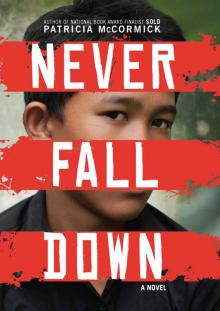 Never Fall Down
Never Fall Down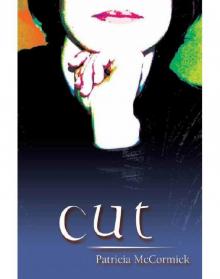 Cut
Cut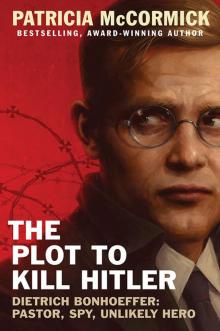 The Plot to Kill Hitler
The Plot to Kill Hitler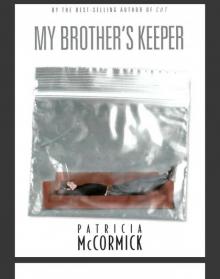 My Brother's Keeper
My Brother's Keeper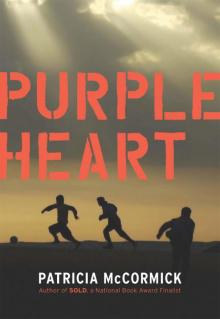 Purple Heart
Purple Heart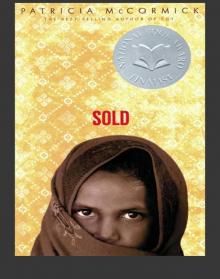 Sold
Sold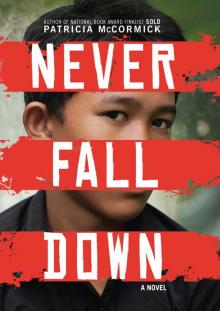 Never Fall Down: A Novel
Never Fall Down: A Novel